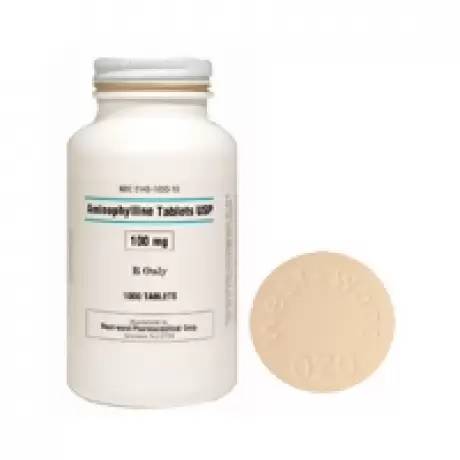
Aminophylline Tablets Rx
Aminophylline (Generic) Tablets for Pets
Why has my veterinarian prescribed Aminophylline?
Aminophylline is a bronchodilator prescribed to treat asthma and bronchitis. This medication is also used to treat congestive heart failure and pulmonary edema. This drug relaxes the smooth muscles in the airway allowing your pet to breathe more easily. Aminophylline is given by mouth or injection and is available as tablets, extended release tablets, liquid, and as an injectable. Trade names for Aminophylline are Phyllocontin and Truphylline.
This drug should not be given to pets with: certain heart diseases, high blood pressure, hyperthyroidism, liver or kidney disease and stomach ulcers. Animals that are geriatric or pediatric or that may be pregnant or nursing should not take this medication.
Animals with a known hypersensitivity or allergy to Aminophylline should not take this medication.
What should I talk to my veterinarian about before giving my pet this medication?
Talk to your veterinarian about any required rechecks while on this medication and
what tests may need to be performed prior to and during treatment with this drug.
Also ask your veterinarian about the risks and benefits of using this drug. Be sure to tell your veterinarian about all medicines and supplements that you give your pet or plan to give your pet, including those you can get without a prescription. Your veterinarian may want to check that all of your pet's medications can be given together.
Be sure to tell your veterinarian if your pet has experienced:
- side effects on other drugs/products
- digestive upset now or ever
- liver or kidney disease now or ever
- any other medical problems or allergies now or ever
Let your veterinarian know if your pet is pregnant, nursing, or if you plan to breed your pet.
How do I give Aminophylline?
- First, READ THE LABEL CAREFULLY.
- Give Aminophylline to your pet as directed by your veterinarian.
- This medication is often given on an empty stomach.
- Ensure that your pet has plenty of fresh water available at all times.
- Try to give this medication at about the same time each day to keep constant levels in the blood.
To prevent dosing with a large amount of medication, do not let your pet chew or break the extended release forms of this medicine.
Baseline blood work is recommended to evaluate your pet's general health before starting this drug. Periodic blood work to monitor its effect on the body is also advised if long-term therapy is necessary. Adjustments to dosing levels may be made based upon these results and an assessment of how your pet is responding clinically.
- DO NOT give your pet more medicine than directed.
- DO NOT give your pet medicine more often than prescribed.
- DO NOT skip doses or stop giving your pet Aminophylline unless directed by your veterinarian. Plan ahead to ensure you have the refills you need.
If I miss a dose, what do I do?
If you miss a dose, give it to your pet as soon as possible. If it is almost time for the next dose, skip the missed dose, then continue with the regular dosing schedule. Do not give your pet two doses at once.
How do I store Aminophylline?
Keep this medicine out of reach of children and pets.
Call your physician immediately if you accidentally take this product.
Store this medicine at room temperature in a dry, cool place. Keep this medicine away from heat and direct sunlight.
Do not store this medicine in damp places, in the bathroom, or near the kitchen sink. This medication can break down when exposed to moisture or heat.
What are the potential side effects of Aminophylline?
This medication may affect the gastrointestinal system and cause nausea, vomiting, and diarrhea. It can also cause increase in appetite, drinking, and urination. This medication can affect the cardiovascular system causing a fast heart rate and irregular rhythm.
Aminophylline can affect the central nervous system causing anxiety, nervousness, seizures, and difficulty with sleeping.
If these symptoms continue or get worse or you notice anything else unusual, contact your veterinarian.
What about possible drug interactions?
Aminophylline may interact with the following drugs: allopurinol, calcium channel blockers (amlodipine), cimetidine, ciprofloxacin, clindamycin, enrofloxacin, ephedrine, erythromycin, halothane, isoproteronol, ketamine, ketoconazole, lincomycin, phenobarbital, phenytoin, propranolol, and thiabendazole
Drugs other than those listed may also interact with Aminophylline.
Do not give your pet new food or medications without first talking to your veterinarian.
If your pet experiences any unusual reactions when taking multiple medications, contact your veterinarian.
What about overdosing?
Contact your veterinarian immediately if your pet receives more than the prescribed amount.
What else should I know?
Notify your veterinarian if your animal's condition does not improve or worsens despite this treatment. As with all prescribed medicines, Aminophylline should only be given to the pet for which it was prescribed and it should only be given for the condition for which it was prescribed.
This is just a summary of information about Aminophylline. If you have any questions or concerns about Aminophylline or the condition it was prescribed for, please contact your veterinarian.





